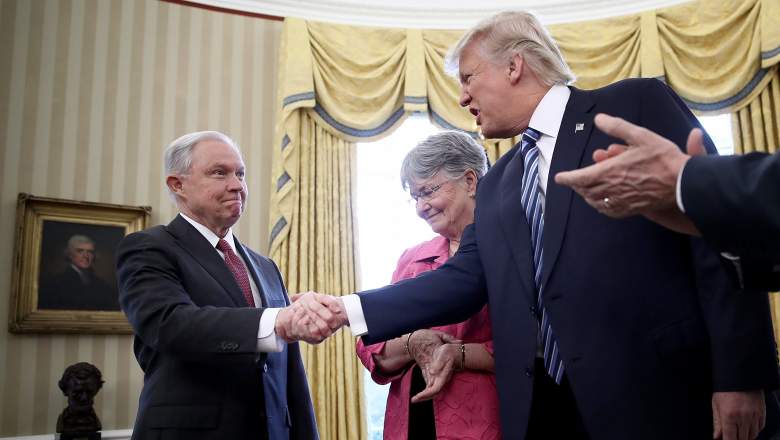
President Donald Trump‘s relationship with Attorney General Jeff Sessions continues to be strained, highlighted by a Monday morning tweet where he called the former Alabama Senator “beleaguered.” What did the president mean by using that word to describe one of his earliest mainstream political supporters?
Merriam-Webster defines the term as “suffering or being subjected to constant or repeated trouble or harassment.” Its first known use dates back to 1644. The dictionary notes that the word was first used in a military sense and was derived from the Dutch word “belegeren.”
“So why aren’t the Committees and investigators, and of course our beleaguered A.G., looking into Crooked Hillarys crimes & Russia relations?” Trump tweeted.
In other words, Trump was telling his 34.4 million followers that he believes his own Attorney General has been the victim of constant harassment. In the tweet, Trump also complained about Sessions not investigating Hillary Clinton‘s “crimes” and her relationship with Russia.
The relationship between Sessions and Trump has reportedly been in trouble since Sessions announced in March that he was recusing himself from all investigations and matters related to Russia’s meddling in the 2016 presidential election. Sessions was pressured to do so after it was revealed that he inaccurately told Congress in his January confirmation hearings that he had no communication with anyone in the Russian government. However, on March 1, The Washington Post reported that Sessions did meet with Russian Ambassador Sergey Kislyak twice during the campaign.
Sessions’ decision to recuse himself left the Russian investigation to his deputy, Rod Rosenstein, who then hired former FBI Director Robert Mueller as special counsel to run an independent Russia investigation.
Last week, Trump said in an interview with the New York Times that he wouldn’t have chosen Sessions as Attorney General if he knew Sessions would recuse himself from Russia matters.
“Sessions should have never recused himself, and if he was going to recuse himself, he should have told me before he took the job and I would have picked somebody else,” Trump told the Times.
Sessions responded to Trump’s comments to the Times by insisting that he will stay on. The White House has also said that Trump still has confidence in Sessions.
“I have the honor of serving as attorney general. It’s something that goes beyond any thought I would have ever had for myself,” Sessions said on July 20. “We love this job, we love this department and I plan to continue to do so as long as that is appropriate.”
Sessions was the first cabinet appointment from Trump, as a reward for Sessions being the first sitting Senator to endorse Trump in early 2016. The 70-year-old Sessions had long desired becoming attorney general, having previously served as the U.S. Attorney for the Southern District of Alabama during the Ronald Reagan, George H.W. Bush and Bill Clinton administrations, then Attorney General of Alabama before he was elected to the Senate in 1996. In June, the New York Times reported that Sessions offered to resign, but he stayed on.
Meanwhile, Axios is reporting that Trump “raised the possibility” of nominating former New York Mayor Rudy Giuliani to replace Sessions. Giuliani was a longtime ally of Trump’s, but was not given a role in the administration. Giuliani later told CNN that he is not being considered and Sessions’ decision to recuse himself from Russia matters was the right move. Giuliani said he was only in Washington D.C. for business meetings.